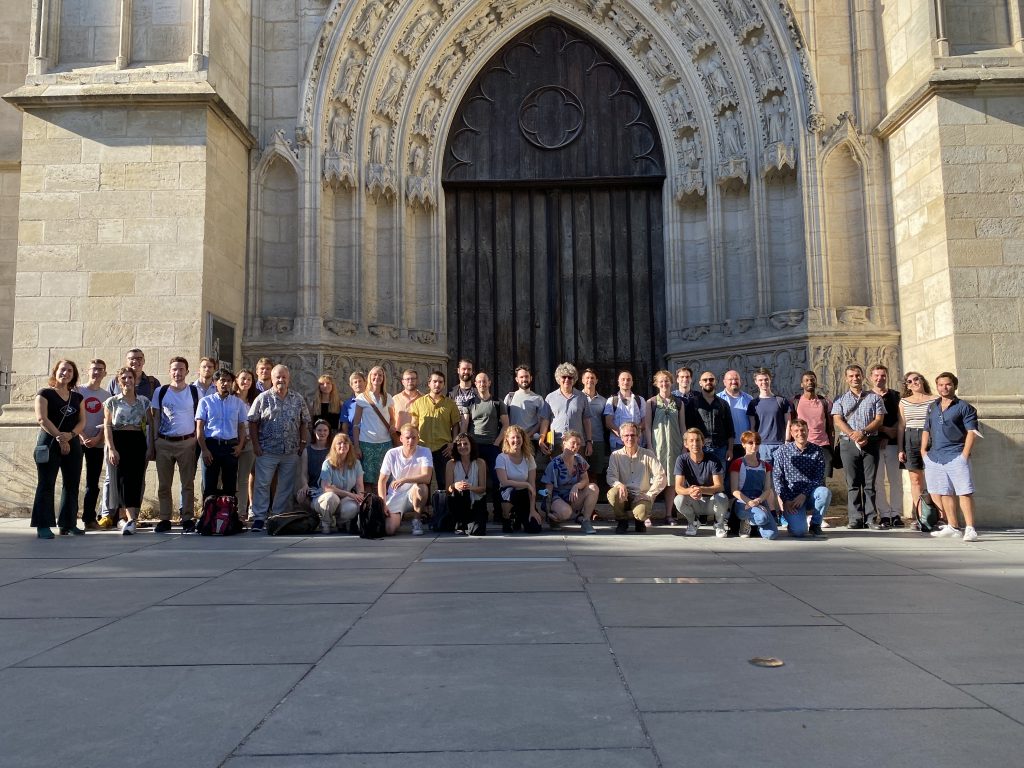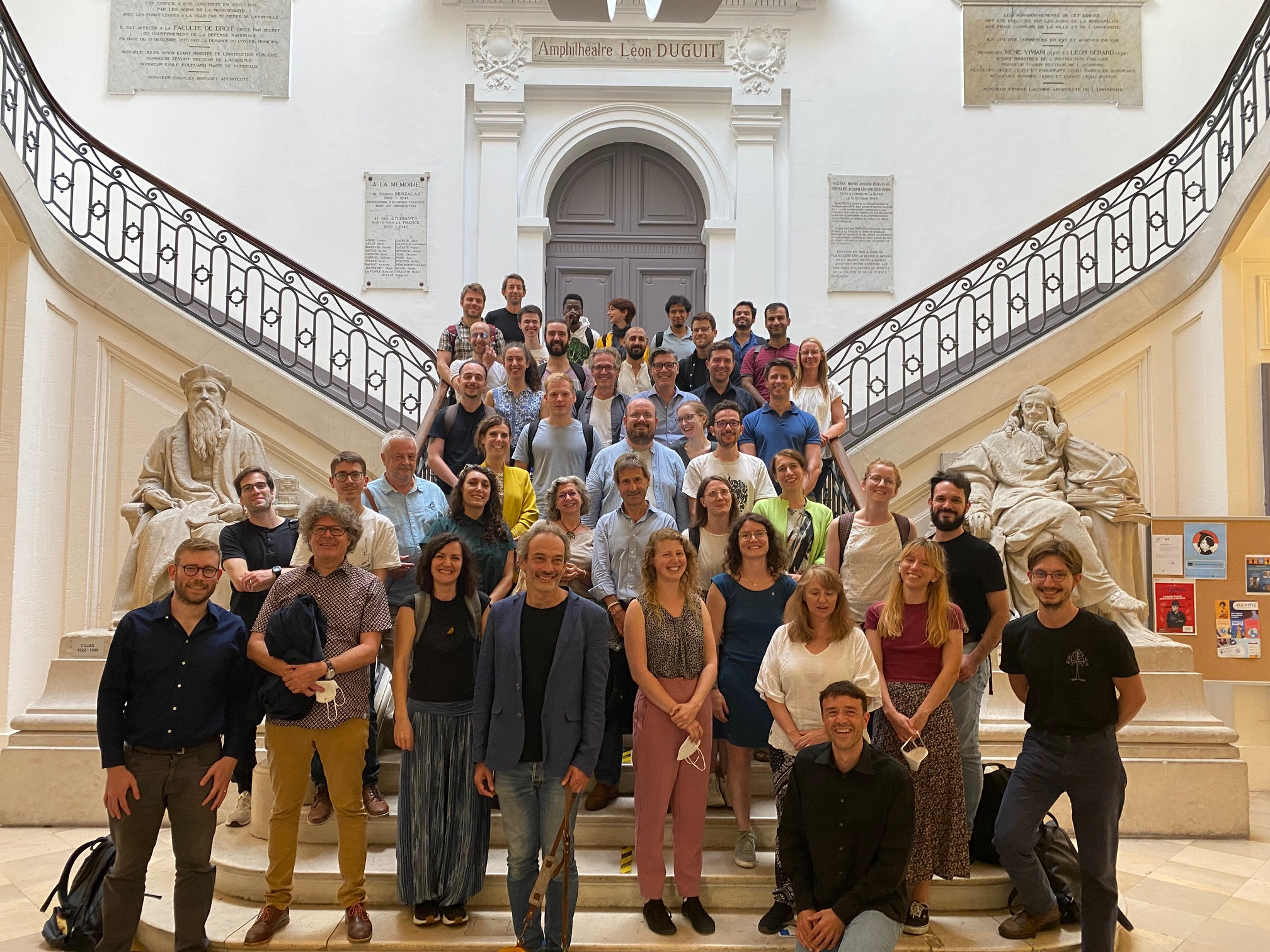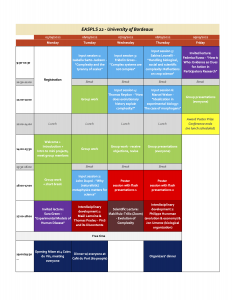
- This event has passed.
European Advanced School in the Philosophy of the Life Sciences: Dealing with Complexity in the Biological and Biomedical Sciences
5 September 2022 - 9 September 2022

EASPLS 2022
Sixth European Advanced School in the Philosophy of the Life Sciences (EASPLS)
“Dealing with Complexity in the Biological and Biomedical Sciences”
Institute for Philosophy in Biology & Medicine & ImmunoConcEpT lab,
University of Bordeaux & CNRS, Bordeaux, France
September 5th-9th, 2022
Directors: Thomas Pradeu & Maël Lemoine (Bordeaux); Marcel Weber (University of Geneva)


The European Advanced School in the Philosophy of the Life Sciences (EASPLS) consortium will hold its sixth biennial summer school on “Dealing with Complexity in the Biological and Biomedical Sciences” at the University of Bordeaux in France. It will gather young scholars (PhD students and early post-doctoral researchers) in the history, philosophy and social studies of the biological, biomedical, and environmental sciences.
Fees and benefits
Registration fees are €300. The summer school will cover lunches and the opening dinner. Participants will take care of their own accommodation and travel expenses.
Financial support
This School is an ISHPSSB Off-Year Workshop, so graduate students can get financial support for their participation. They can also get support from the PhilInBioMed network in Bordeaux.
If you would like to request financial support, please contact Thomas Pradeu.
Venue
University of Bordeaux, 35 Place Pey Berland 33000 Bordeaux, France.
This is the heart of the historic city center of Bordeaux.
Program
Please click on the image to see the detailed program.
Three Invited Guest Lecturers
In addition to instructors from the consortium, we are delighted to announce that Sara Green (University of Copenhagen, Denmark) and Federica Russo (University of Amsterdam, Netherlands) will be joining the summer school as Invited Guest Lecturers, and Iñaki Ruiz-Trillo
(ICREA research professor at Institut de Biologia Evolutiva (CSIC-UPF), Spain) as our Scientific Guest Lecturer.
Federica Russo (Joint work with Guido Caniglia): How is Who: Evidence as Clues for Action in Participatory Research
Participatory approaches in sustainability science (SuS) and public health (PH) research contribute to generating evidence that can support interventions involving citizens, patients and entire communities. However, existing accounts of evidence-based policies and interventions are not adequate to deal with the kind of evidence generated and used in such approaches. In this paper, we present an account of evidence as clues for action in mixed mechanisms through participatory research, inspired in its main traits by Susan Haack’s work. Differently from most accounts of evidence for use in policies and interventions, our account combines action-oriented (the how) and actors-oriented (the who) dimensions of participatory research that takes place in mixed mechanisms involving a multiplicity of interconnected factors when, from biological to social and cultural. Building on Haack’s theory and enhancing it through works on evidence from philosophy of science, science studies and political sciences, we flesh out six procedural criteria for the generation and mobilization of evidence in and from participatory SuS and PH research. Action-oriented criteria invite to look at evidence from a foundherentist, gradational and quasi-holistic perspective. Actors-oriented criteria point out that evidence generation and utilization are social, personal, and experiential. We suggest that these criteria may reinforce participatory approaches to address complex problems in sustainability science and public health allowing for the generation of a kind of practical objectivity.
Sara Green: Experimental Models of Human Disease
Animal models are central elements in biomedical research and preclinical trials, where they are used to reduce, represent, or mimic the biological complexity of their human counterparts. But how are results from animal experimentation developed and used as evidence for insights about human disease? This talk will reflect on the persistent tension between standardization and variation in preclinical models. I explore how model virtues are balanced in different model types, illustrated through concrete examples. Moreover, I discuss potentials and challenges for replacing animal models with non-animal based methods, such as patient-derived organoids.
Iñaki Ruiz-Trillo (ICREA research professor at Institut de Biologia Evolutiva (CSIC-UPF), Spain), “The evolution of complexity: how unicellular protists became animals”
Ruiz-Trillo’s team has done fascinating work on the origins of multicellularity. Ruiz-Trillo will present his views on how complexity evolved and the very definition of ‘complexity’ in the context of evolutionary biology and major transitions in evolution.
Senior Researchers
Instructors at EASPLS 2022 in Bordeaux will come from all the Institutes of the Consortium:
- John Dupré (Exeter)
- Philippe Huneman (Paris)
- Maël Lemoine (Bordeaux) (co-director)
- Sabina Leonelli (Exeter)
- Thomas Pradeu (Bordeaux) (co-director)
- Thomas Reydon (Hannover)
- Isabella Sarto-Jackson (KLI)
- Jon Umerez (San Sebastian)
- Marcel Weber (Geneva) (co-director)
What is the EASPLS?
The European Advanced School for the Philosophy of the Life Sciences is a biennial event that aims at fostering research, facilitating collaborations, and provide professional training for students in the field of the philosophy, history, and social studies of the life sciences, broadly conceived. EASPLS is organized by a consortium of the following European top-level institutions in the area of philosophy, history and social studies of the life sciences:
- Centre for Philosophy of Science, Departmentof Philosophy, University of Geneva, Switzerland
- Department of Neurosciences and Rehabilitation, University of Ferrara, Italy
- Egenis,the Centre for the Study of Life Sciences; University of Exeter, UK
- IASResearch Centre for Life, Mind and Society; University of the Basque Country, San Sebastian, Spain
- Institute of Philosophy; Leibniz University Hannover, Germany
- Institutefor the History and Philosophy of Science and Technology (IHPST); University of Paris 1 Panthéon-Sorbonne, France
- Institute for Philosophy in Biology & Medicine (PhilInBioMed) & ImmunoConcEpT lab, University of Bordeaux & CNRS, France
- KonradLorenz Institute for Evolution and Cognition Research (KLI), Klosterneuburg, Austria
Format
EASPLS is characterized by its unique format. The summer school includes different forms of participation and aims to foster structured interactions among participants and between participants and senior researchers. The schedule mixes:
· Inputs and discussions led by senior researchers in the consortium on the topic “Dealing with Complexity in the Biological and Biomedical Sciences” (Readings may be circulated in advance).
· Inputs and discussions from two guest researchers in the philosophy of the life and medical sciences: Sara Green and Federica Russo.
· Group work addressing questions related to the topic “Dealing with Complexity in the Biological and Biomedical Sciences”.
· Roundtable discussions and activities tailored to professional development (e.g., publishing in the field, preparing for an interview, etc.)
· The selected participants will bring a poster that will stay in the rooms of the Summer school for the whole duration of the event. Participants will present their posters in the form of short 3 minute-presentations for the rest of the people at the summer school.
Host Institution
EASPLS 2022 will be held in Bordeaux, France (Bordeaux has an international airport; it takes 2h by train to go from Paris to Bordeaux). It is organized by PhilInBioMed, both an interdisciplinary institute located at the University of Bordeaux, France, and a national and international network of interdisciplinary institutes. PhilInBioMed aims at promoting philosophy in the biological and medical sciences, a co-production of knowledge by the direct interactions of philosophers, biologists, and medical doctors.
In Bordeaux, the Conceptual Biology and Medicine Team (PIs: T. Pradeu & M. Lemoine) is part of ImmunoConcept, an immunology lab with a team of philosophers embedded, who are bringing their conceptual expertise into scientific projects in various topics (from immunology to cancer and neuroscience).
The University of Bordeaux is a thriving European University situated in a fast developing city.
Topic of EASPLS 2022: “Dealing with Complexity in the Biological and Biomedical Sciences”
Complexity, from genomes to ecosystems, is a fundamental characteristic of living systems. In dealing with complexity, the life and medical sciences have developed over the centuries a wide range of epistemological and methodological approaches as well as social and institutional configurations to organize and perform scientific work. The goal of this summer school is to bring together senior and junior researchers in the philosophy of life sciences to jointly reflect on and discuss:
- Epistemological and methodological issues in relation to complexity. We will look into the many practices developed in the biological, biomedical, and environmental sciences, in order to deal with the complexity of life. For instance, we will address the many roles that experiments, data, theories, models as well as heuristics, explanations or visualizations have played in the development of the life and medical sciences.
- Ontological and metaphysical issues in relation to complexity. We will discuss issues related with complex causation in living systems, mechanistic constitution, process thinking as well as modularity and robustness as ways to understand the main characteristics of living systems in the biological, biomedical, and environmental sciences.
- Institutional, societal, and political dimensions of scientific work dealing with complexity. We will discuss social-organizational issues that emerge in relation to scientists’ various approaches to deal with complexity in the biological, biomedical, and environmental sciences. For instance, we will talk about the emergence of inter and transdisciplinary research centers and consortia; the different -omics; different configurations of sharing research materials and results; real-world laboratories at the science-society interface or big-data labs from medicine to sustainability science.
- The role that historians and philosophers of the life sciences can play in critically contributing to support scientific attempts to deal with complexity in the biological, biomedical, and environmental sciences.
Using examples from past and current science, during the summer school, we will analyze and reflect together on experimental, conceptual, and theoretical practices and strategies that scientists from different disciplines in the life and medical sciences have created when dealing with complex living systems. The organizers aim to assemble a community of scholars addressing these issues from a wide variety of perspectives and whose research focuses on wide diversity of topics in the life sciences broadly conceived. The following areas of work serve to illustrate the sorts of issues that are in focus for the summer school, but it should be emphasized that EASPLS 2022 welcomes inputs and ideas that are not limited to the issues mentioned below.
Historical and current examples of dealing with complexity in disciplines and field such as:
- Evolutionary biology and systematics, e.g. phylogenetic inference, evolutionary developmental biology.
-
- Developmental biology, e.g., whole-organism lineage tracing
- Genetics and genomics, e.g., genome-wide association studies, integrative data-clustering
- Biological domains dealing with complex distributed systems, such as Neuroscience and Immunology
- Clinical research, e.g., randomized controlled trials, real-world evidence
- Cancer research, e.g., tumor typing.
- Public Health, e.g. decision-making, policy-making
- Personalized medicine e.g. diagnostic tool, interventions, and drug development
- Molecular and systems biology, e.g., gene regulatory networks
- Synthetic biology and genome editing
- Conservation sciences, e.g. systematic conservation planning and biodiversity
- Climate change research, e.g., simulations, forecasting, scenarios, visioning
- Sustainability science, e.g. transdisciplinary projects, real-world experimentation
Application
Applications are closed. Applicants have been notified in April 2022.
Applicants should send to the following email address: philinbiomed@u-bordeaux.fr a single pdf file (labelled: LastName-Firstname-easpls2022.pdf) containing:
- Letter of motivation (max 500 words)
- Title andAbstract (max 500 words) for a poster
- Short Curriculum Vitae (max 3 pages)
The deadline for applications is February 25, 2022. Applicants will be notified of decisions by late April 2022.

